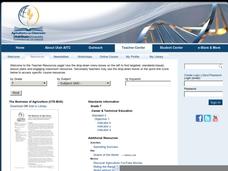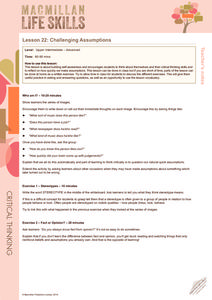Curated OER
High-Tech Food: Science in Your Shopping Cart
Kids are given a lot to think about, as they delve into the world of high-tech foods. They discuss GMOs, biotechnology, food enhancements and domestication. They view videos, engage in class discussions, complete worksheets, and learn...
Curated OER
Source Search: Agricultural Products
Farmers just farm, right? Find out how important agricultural products are to our modern society. Learners will explore the foods, textiles, and fuels made from industrial farm goods. They'll also explore the idea of choosing an...
Curated OER
The Business of Agriculture
Learners explore the importance of agribusiness in the US economy. They play one game where they sort and discuss the importance of agricultural commodities. They also play the game Pit to better understand how agricultural products are...
Curated OER
Navajo Code Talkers
An engaging lesson focuses on the contributions of the Navajo people during World War II. Learners read the book Navajo Code Talkers by Andrew Santella, answer a series of comprehension questions about the text, and write a letter...
Curated OER
Editorials- Facts that Support Opinions
Fourth graders complete a worksheet. In this author's opinion lesson, 4th graders read editorials and determine how the use of facts supports the author's opinion. Students complete a facts to support opinions chart.
Curated OER
Identifying Facts and Forming Opinions
Kirsten Hall's animal books provide learners with an opportunity to practice forming statements of opinions and factual statements. Using sentence starters such as "I learned. . ." and "I think. . ." class members craft sentences cite a...
Curated OER
Identifying Opinions with Signal Words
First graders identify opinions within a text. In this language arts lesson, 1st graders discuss the definition of opinion. Students identify words that signal opinions and work together to identify opinions within the text.
Clever Student Training Company
Logical Fallacies Recognition
“Should same-sex marriage be allowed?” As part of a study of recognizing logical fallacies learners read John Stemberger’s April 12, 2012 argument against same-sex marriage published on the opinion page of the Orlando Sentinel. They then...
Curated OER
Strong Convictions
How can the rhetorical structure of an editorial help to develop its argument? Use this New York Times editorial to emphasize the importance of structure in a piece of informational text. Adolescent writers then use the editorial as a...
Virginia Department of Education
Analyzing and Planning Persuasive Writing
Young writers work backward to analyze persuasive techniques. As a class, work through the provided persuasive letter: a plea to an imaginary city council to lift a city-wide ban on fast food restaurants and discount stores. Start by...
University of Nebraska
Why Do I Want All This Stuff?
How do advertisers influence consumers? The big idea here is that once consumers understand the factors that influence their desire for a product or service, they are better able to consider substitute and/or complementary products.
Curated OER
Children's Media and Censorship
High schoolers form opinions about children and television censorship after analyzing literature. They complete a journal writing activity to identify the topic and make a list of inappropriate television shows for children. Next, they...
Prestwick House
Understanding Language: Slant, Spin, and Bias in the News
We live in a time of fake news, alternative realities, and media bias. What could be more timely than an activity that asks class members to research how different sources report the same topic in the news?
Bright Hub Education
Using Evidence and Supporting Details in Writing
In expository writing, it is important to back up claims with evidence and details. Help your class to develop their writing with notes on different types of evidence. Once they have the basics down, practice with a sample thesis and...
Curated OER
Don't Let the Earth Down
Writing a persuasive argument starts with a clear thesis. Using this resource, your class will write a persuasive paper on a conservation issue. They will then transform their argument into a 30-second public service announcement. If...
Curated OER
The School Holiday Calendar
Various Muslim holidays and their meanings are researched and your students will predict whether or not they should be recognized on the New York City school calendar. An extension could be to write a letter to the Mayor about...
iCivics
Yeah, But...
Impress upon your young learners the importance of formulating counter arguments based on facts and not opinions. This resource is meant to strengthen arguments designed in a previous instructional activity, but could also be used as a...
Macmillan Education
Challenging Assumptions
After experiencing how quick and easy it is to make judgments as part of an opening activity, learners discuss the concept of a stereotype and the need to think critically and question our immediate assumptions.
Curated OER
Osage, Legend, and Arkansas History
Elementary schoolers evaluate the legend of Norristown Mountain by looking at facts about the Osage Indians and the legend itself. They do an exploration of Arkansas' Native American groups which includes a look at their legends,...
Curated OER
Aboriginal Education - A Canadian Failure?
Students discover that the education of the Aboriginal was a government and church "mission." They develop respect for the Aboriginal people and their continuing concerns about their treatment at the hands of the missionaries and the...
Curated OER
Credible Sources on the Internet: What to Trust, What to Dismiss and When to Cite a Source
Wait, you mean researchers don't all use Wikipedia? Teach your class about intelligent research with a lesson about evaluating digital sources. The lesson starts with a quickwrite and includes vocabulary exercises and several...
Curated OER
Flying Freudian Fun: A Look At Ethical Decision Making
There are not many more apt examples of ethics gone awry than William Golding's Lord of the Flies.. Ninth graders focus the ethics of decision making with the examples provided in the plot. They focus on the...
Curated OER
Family Foodways
Discover, document and share the knowledge of family food and ways special occasions are treated. Your class will explore the context in which food traditions are created and adapted in their families and communities. Each student also...
Curated OER
Men of Steel
Students explore early 20th century steel making. In this U.S. history steel making lesson, students view and describe a postcard and a picture depicting exaggerated aspects of the steel industry. Students listen to a poem...
Other popular searches
- Fact Opinion Lesson Plans
- Fact and Opinion Passages
- Fact Opinion Worksheet
- Fact and Opinion Lessons
- Teaching Fact vs. Opinion
- Fact and Opinion Worksheets
- Teaching Fact and Opinion
- Fact and Opinion Games
- Reading Fact and Opinion
- Fact and Opinion Keywords
- Identifying Fact or Opinion
- Fact Opinion Quiz

























